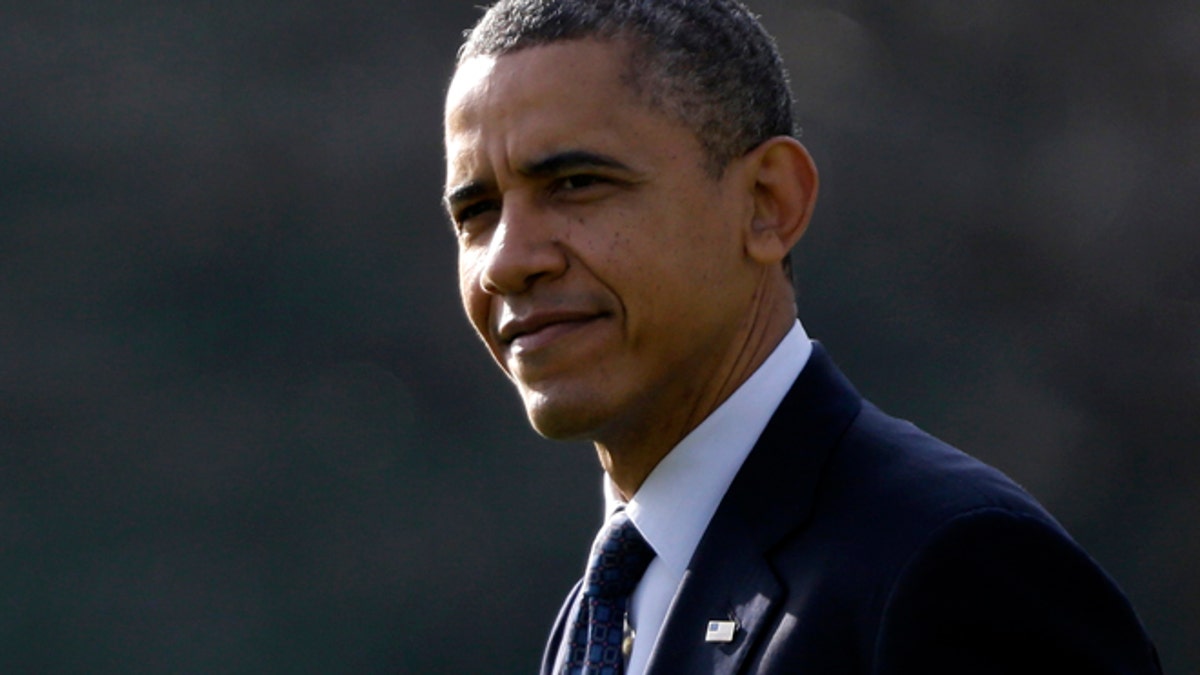
Nov. 30, 2012: President Barack Obama walks on the South Lawn at the White House in Washington. (AP)
President Obama, fresh off his victory lap, is about to overplay his hand.
The most recent proposals from the White House aimed at averting the fiscal cliff included not only the president’s cherished tax hikes, but other demands that will strike any neutral observer as absurd.
Even the liberal media couldn’t swallow the fantasy launched by Treasury Secretary Tim Geithner; the New York Times described the plan as “loaded with Democratic priorities and short on detailed spending cuts.”
Mr. Geithner, acting as the president’s missionary, proposed extending the payroll tax cut (something both parties earlier opposed), $1.6 trillion in tax hikes – way beyond previous demands -- extension of unemployment benefits that already exceed any previous coverage – and also a “permanent” ability to raise the debt ceiling, independent of Congress. There was no significant effort to rein in our bloated spending.
The president is also demanding a new $50 billion stimulus program – a request that threatens to remind voters of just why it was they gave Republicans control of the House after Mr. Obama’s first two years in office.
[pullquote]
The president is feeling feisty. He has been energized not only by victory, but also by returning to his comfort zone: campaign-style events in which he’s touted his tax hikes on the wealthy. But -- his approval ratings have already started to sag (Rasmussen has his approval index and minus 7 compared to a post-election high of minus 2), and the number of people convinced the country is heading in the wrong direction is again on the increase.
President Obama appears very confident that if the budget talks fail, Republicans in the House will attract most of the blame. That may be, but he should remember that his own approval ratings collapsed to an all-time low in the aftermath of the failed debt ceiling negotiations last year. Voters may hold GOP leaders responsible, but they won’t be happy with their president, either. If he hopes to follow through on his campaign promises -- including tackling immigration reform, for instance – he needs the backing of the people. Otherwise, his legacy will be trillions in new debt, and a failed recovery.
Mr. Obama also seems to think that by reelecting him, voters gave a rousing thumbs-up to his fiscal choices, which so far have focused primarily on raising taxes on rich people. While polls show the latter to be popular, they also indicate that cutting spending and reining in our budget deficits remain a high priority for Americans. Indeed, recent (post-election) Gallup polling indicates that a growing number of Americans (45%, up from 32% last year) want to mend our fiscal wound through equal measures of tax hikes and spending cuts. The number that favor only raising taxes (which seems to be Mr. Obama’s main thrust) has stayed unchanged at just 11%.
According to Gallup, some 99% of Americans think a strong economy and job market should be President Obama’s number one goal in his second term. The number two priority (88% of those polled) is taking “major steps” to ensure the long-term stability of Social Security and Medicare. Those necessary steps are, of course, opposed by Democrats. Most people (92%) consider “major cuts” to federal spending an important objective as well.
On that front, they are likely to be disappointed. For October, the deficit soared 22% year-over-year, to $120 billion; spending increased 16% from the year-earlier period. Imagine; even as President Obama boasts of cutting spending, actually outlays are rising at 16%. Funny how the September report, released just before the election, showed a surprising $75 billion surplus. The September figure (mostly reflecting “shifts in the timing of certain payments” according to the CBO) was hailed by the left-leaning Daily Kos website with this headline: “Democrats, As Usual, Better at Deficit Reduction.” Not really.
Another quite recent Gallup poll shows Americans want compromise – from both parties; eight in ten think that averting the fiscal cliff is very important. Astonishingly, given the ideological divide today, 68% of respondents say that both sides should “compromise equally.” That doesn’t sound like a mandate to steamroll the GOP.
How important is a reasonable compromise going forward? Extremely important. Despite all the excitement over parking-lot scuffles, which have become as much a part of Thanksgiving as stuffed turkey, consumers did not shop with enthusiasm this year. Self-reported data collected by Gallup indicates that consumers spent on average $67 per day the week ended November 25, which included Black Friday weekend, down from $83 a year ago and $79 in 2010. In fact, the figure is equivalent to the depressed 2009 total. Upper-income (self-reported) spending has been trending down since September. This is not too surprising, since wealthier Americans worry that their taxes will go up next year. Since it has been higher-income Americans that have had the capacity to boost spending, this is not a positive trend for the economy. Overall, just-reported consumer spending in the third quarter was disappointing, rising only 1.4%; the figure was revised down from an earlier estimate of a 2% gain.
Bottom line: the country’s prospects may have brightened recently, as housing has staged a modest bounce off its bottom, but the consumer, and the economy, remains extremely fragile. This is not a good time to undermine the uptick in confidence by resorting to extreme measures – or by trying to score political points.
President Obama may enjoy accolades from liberals for trying to push through income-equalizing tax changes, but most Americans want to see progress on putting our fiscal house in order, and reasonable compromise. They want to see the economy pick up steam and the unemployed go back to work. They are looking for leadership; it’s time they found it at 1600 Pennsylvania Avenue.
